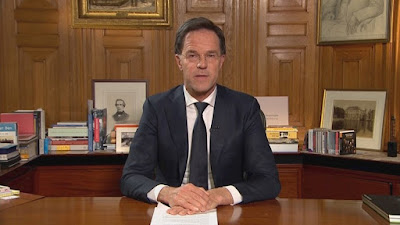The Art of Statesmanship
Political
leadership and the coronavirus
Prime
Minister Rutte addressing the people of the Netherlands
Good evening,
The coronavirus is putting our country on hold.
The coronavirus is putting our country on hold.
Us, and
the rest of the world.
Together,
we face a task of enormous proportions.
Many
people will recognize the feeling that we have been on a roller coaster that
seems to be going faster and faster in recent weeks.
You
wonder: is this really happening?
Because
the measures taken here and elsewhere are unprecedented for peacetime
countries.
At the
beginning of this speech, I would like to express my condolences to the
families of the people who have already died from the virus.
I wish
everyone who is in hospital or recovering at home a speedy recovery.
And I
want to address the elderly and those in poor health.
I
realize that you have great concerns.
And that's why I want
to tell you that our absolute priority is to minimize the risks for you.
With all the news from
home and abroad, with all the events following each other at breakneck speed,
it is perfectly logical that there are concerns in society on a very wide
scale.
We all have questions.
What can I do to
protect myself and the people around me?
What about school and
work?
Can a children's party
still go on? A family weekend? A wedding?
How long is all this
going to take?
And why does one
country take different measures than another?
“It’s one person coming in from China and we
have it under control. It’s going to be just fine.”
President Trump on Jan 22
In today's world, news
and information are faster than the light and an opinion is given quickly.
I understand that.
However, the answer to
all the questions that live starts with the knowledge and experience of
experts.
Let us hold on to that.
To experts like Jaap
van Dissel and his colleagues inside and outside the RIVM.
Virologists, intensive
care doctors and other specialists.
Their advice has been
leading from the outset for all the measures taken so far in the Netherlands.
And it is important
that we continue to rely on that compass of scientific knowledge and reliable
facts.
That is the only
sensible way to continue to take the necessary steps.
Steps that will
inevitably come our way.
Cause I don't have an
easy message for you tonight.
The reality is, the
coronavirus is among us and will remain among us for the time being.
There is no easy or
quick way out of this very difficult situation.
The reality is also
that a large part of the Dutch population will be infected with the virus in
the near future.
That is what the
experts are telling us now.
And what they are also
telling us is that while waiting for a vaccine or medicine, we can slow down
the spread of the virus and at the same time build up controlled group
immunity.
“The Coronavirus is very much under control in the USA.. Stock Market starting
to look very good to me!” - President Trump on Feb 24
I have to explain that.
Whoever had the virus
is usually immune after that.
Just like old times
with the measles.
The larger the group
that is immune, the smaller the chance for the virus to jump over to vulnerable
older people and people with weak health.
With group immunity, it
is as if you're building a protective wall around them.
That's the principle.
But we have to realize
that it can take months or even longer to build up group immunity and in that
time we have to protect people who are at greater risk as much as possible.
All things considered,
there are three possible scenarios.
The first scenario is
an all-out control of the virus.
This leads to a
controlled spread, among groups at least risk.
That's the scenario of
our choice.
Maximum control means
that we try to smooth out the peak in the number of infections and spread them
over a longer period of time.
With this approach, in
which most people will only develop mild symptoms, we build immunity and ensure
that care is able to cope, with the aim of ensuring that nursing homes, home
care, hospitals and especially intensive care units are not overburdened.
So that there is always
sufficient capacity to help the people who are most vulnerable.
The second scenario is
that we let the virus take its course uncontrollably.|
This would completely
overload our care system at the peak of the infection, leaving insufficient
capacity to help vulnerable elderly people and other high-risk patients.
Of course, we must
prevent this at all costs.
The third scenario is
that we endlessly try to stop the virus.
That means that the
country will be completely locked down.
Such a rigorous
approach may seem attractive on the face of it, but experts point out that it
wouldn't be a matter of days or weeks.
In that scenario, we
would actually have to shut down our country for a year or even longer, with
all the consequences that would entail.
And if it were
practically possible - to allow people to leave their homes alone with
permission for so long - the virus could reappear immediately if the measures
are withdrawn.
The Netherlands is an
open country and as long as there is no vaccine, the coronavirus will continue
to travel the world like a wave and not skip our country.
All advice so far, all
measures previously announced are aimed at the first scenario of 'maximum
control'.
From the relatively
simple guidelines of not giving hands, washing hands more often and keeping one
and a half meters away to far-reaching measures such as banning larger
gatherings and closing down the hospitality industry.
And of course we keep
our finger on the pulse every day.
How long the measures
are needed and whether more is needed therefore depends on how the virus will
behave in the coming weeks and months.
And on any new
scientific insights, because the research does not stand still.
It may be that some of
the measures can be relaxed, but sometimes we have to take an extra step to
prevent the virus from seeping around uninhibitedly.
It will continue to fit
and measure in the coming months.
It continues to search
for the balance between taking the necessary measures and letting normal life
continue as much as possible.
If we can control the
spread of the virus in this way, the consequences for public health are
ultimately the most manageable.
At the same time, we
cannot and will not close our eyes to the economic consequences of this crisis
A lot of people are
worried about their jobs.
Because for many
companies, large and small, this is an extremely difficult time.
A lot of entrepreneurs
suddenly have their backs against the wall.
The lady of the coffee
shop on the corner, the flower grower, the transport entrepreneur, the
self-employed, but it also applies to national icons such as KLM.
My message to the
entrepreneurs of the Netherlands and their employees is this: the cabinet will
do what is necessary to support you.
We will do everything
we can to make sure that companies don't fall over because of what's happening
now and that people don't lose their jobs.
It will be a difficult
time anyway, but we will not let you down.
“This is a very contagious virus. It’s incredible. But
it’s something that we have tremendous control over.” - President Trump on March 5
Finally, I would like
to thank everyone in the Netherlands for the way in which the instructions and
measures have been followed so far and for all the heart-warming examples of
mutual help and solidarity.
It is good to see that we are there for each other when the need arises.
Keep doing that.
Stay alert and follow the directions, even if you are strong and healthy, in the interests of people who are more vulnerable.
That's really important.
Keep using your common sense and listen to the experts.
Keep helping each other where you can.
This is a time where we need to find each other, over disagreements and contradictions.
A time to put the common interest ahead of one's own.
And a time to give space and confidence to all those people who, under hectic conditions, are working day and night to help others and keep the virus under control.
Cleaners, nurses and doctors in hospitals and care for the elderly, general practitioners and GGD staff, police officers, ambulance staff and all other care workers.
To them, and to all those people who stay at their posts in schools, child care, public transport, supermarkets and wherever else, I want to say: you are doing a fantastic job - thank you very, very much for that.
It is good to see that we are there for each other when the need arises.
Keep doing that.
Stay alert and follow the directions, even if you are strong and healthy, in the interests of people who are more vulnerable.
That's really important.
Keep using your common sense and listen to the experts.
Keep helping each other where you can.
This is a time where we need to find each other, over disagreements and contradictions.
A time to put the common interest ahead of one's own.
And a time to give space and confidence to all those people who, under hectic conditions, are working day and night to help others and keep the virus under control.
Cleaners, nurses and doctors in hospitals and care for the elderly, general practitioners and GGD staff, police officers, ambulance staff and all other care workers.
To them, and to all those people who stay at their posts in schools, child care, public transport, supermarkets and wherever else, I want to say: you are doing a fantastic job - thank you very, very much for that.
I would like to end
with this appeal: with all the uncertainties that exist, one thing is
absolutely clear: the task we face is very big and we really need to do this
with 17 million people.Together we will
overcome this difficult period.
Pay a little attention to each other.
I'm counting on you.
Pay a little attention to each other.
I'm counting on you.
Thank
you very much..
March 15 - Trump declares coronavirus outbreak a national emergency..
March 15 - Trump declares coronavirus outbreak a national emergency..




Comments
Post a Comment